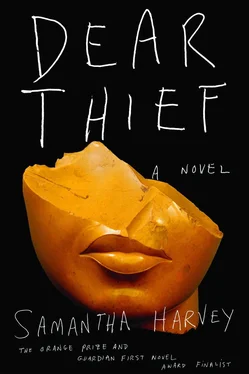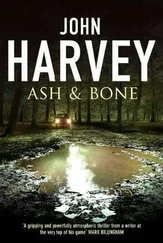And you would ask Nicolas and me, ‘Where did you two meet?’
‘On a filthy Thames beach,’ we would say.
And then a few days later, or a few weeks later, ‘Where did you two meet, anyway?’
‘On a filthy Thames beach.’
You would sigh, ‘Ah yes.’ Which made me think that either you forgot the answer time and again because it wasn’t romantic enough, or that you asked repeatedly because the answer was so romantic you wanted to hear it again. As children are prone to doing with stories they like.
I used to think your longing for other people’s romantic anecdotes was just one of your many ironic gestures, or a strange nervous tic you hadn’t been able to shake off from girlhood — but maybe it was actually one of your more conventional traits. We take all sorts of gleeful interest in things we would never have or do in our own lives, why else would my Wednesday afternoons be spent hauling in a pile of execrable crime novels from the mobile library to feed the appetites of those mild old ladies who read them in a little scented plume of rosehip and lilac? They lap up the stabbings, the disappearances, the trail of blood on the passenger seat. Their lumpy knuckles cannot put the books down; their faces become gentle and settled while they read about gore, as if they are back in their days of breastfeeding. Never so merciful or so reposed, and I can feel a moment of such warmth, such love towards them like that.
And so with you in your own way, if you heard that someone was in love, or had done something sweet. You were absolutely sincere, almost adulatory at the notion of one person loving and finding shelter in the life of another. You would declare, ‘How beautiful’ and then tilt your head off to one side in calculation of exactly how beautiful, and you might not move, and if you were in the middle of doing something like tearing a piece of bread from the loaf, you might stop with the bread poised halfway to your mouth. That same hand, so given to batting away any faint hint of romance for yourself, would float in quivering appreciation of somebody else’s.
‘And then what?’ you once said. ‘After you and Nicolas met. Your first date.’
I told you we went to the Serpentine, to see an exhibition; perhaps that was when he gave me the conch, though I really couldn’t say. It was about a week after my grandmother’s death and the day after her funeral. Perhaps you don’t remember this conversation, but I firmly do. We were sitting at the kitchen table in the cottage in Morda one night drinking Polish vodka, while Nicolas was away for work and Teddy in bed — I’d drunk four or five shots while you’d barely touched your first. I told you about how I stayed the night in my grandmother’s house with my parents after the funeral, and the next morning, while they were going through some of her things and deciding what to do with it all, Nicolas and I went to the Serpentine. We didn’t touch one another, we only toiled chastely around the rooms, hands in pockets, and were polite, and feigned expertise.
You reared up, do you remember? You raged! An exhibition, my friend? My dear friend, who never much liked art or galleries or places that had to be crept around, who took some peculiar Platonic offence at the idea of a painting of a tree, when you could just go and see a tree. A first date at the Serpentine! This insincere use of art for courting couples who’d rather be fucking is a waste of everybody’s time. You said, An obscene squanderment , and you said it standing with your arm flung theatrically. Men and women are born to share their bodies in a way that aeroplanes are made to fly; they should do it shamelessly, routinely. They may do it liberally if they wish, and in different configurations. Men can do it to other men, women to other women. Wives to other women’s husbands, husbands to other men’s wives. Let’s not be prudish. But they should not do it while pretending to do something else. An aeroplane is never coy about flying. Imagine it! Down with the coquettish aeroplane! Somebody put a great deal of work into that exhibition, and all you could think about was your loins. You should have booked an hour in a cheap hotel and been done with it.
Your anger was very unreasonable, Butterfly. You were such a tyrant; just because my romance failed to come up to scratch, you felt your world had been betrayed. This is the problem with people who live vicariously, they ask a lot of their friends. In the face of your outbursts I would always clam up and make a decision to withhold things from you as a punishment for your unreasonableness; maybe you noticed, although, then again, maybe not.
But now I imagine you on your own in this so-called desert, trying to build a life out of little, and it hardly seems to me that it can hurt to step forward again into our conversation, even if so many years later, and end this petty punishment. It never made me feel good anyway. You once intimated that if only I had spoken up more for my relationship with Nicolas you might have behaved differently, and at the time that idea made me sullen with injustice. But maybe there was some truth to it; I have often had to consider that since.
Later on in that conversation with Yannis the other day, after I had refused to write to his wife, we got talking about our marriages. We talked about their early days and the romance. I suppose this is what prompted me to write what I just wrote — which incidentally, on a reread, I think is true in gist, but the outburst about coquettish aeroplanes might be a bit improvised and slightly unfair on you. However, there is the self-made law of honesty to abide by, so it must stay.
Yannis and his wife had their first and last real date at the age of seventeen at Lake Kournas in Crete. They skirted past acres of ocean in a beeline for one clear disc of lake, the only one on the whole island — all that land, and they headed for one tiny hole in it. This is what it is to fall in love, he said, there is a world of firm ground but we go for the gap. We aim for vertigo. In that lake were the inverted White Mountains, whiter and cleaner in the water than they were out, as if the mountains themselves were a crude afterthought.
He and his wife dived in for the mountains, thinking they would find them together. Love makes you very optimistic, he said. An intense day of basking on volcanic rock and slipping into water as pedaloes wove by, a few hours spent burning up with love and enduring the downsides of heat, of midges swarming to one’s warm parts, and by the next day she was pregnant. They married so quickly they never had time for another date, and then their son Akis was born. Akis, who sprung from that day like the infamous Lady of the Lake, who purged Kournas of its sins. Yannis is romantic, like you; when he says that love makes us optimistic, he says so as if we are right to be optimistic. In a way he reminds me of you, and I think you would like him.
This was his turn; when it came to mine I told him about the night Nicolas and I spent locked in the Royalty Theatre in the West End, a night that stands out, one I spent a lot of time thinking about yesterday after I wrote what I wrote. It was October I think, or November, 1976. Nicolas and I went to this theatre, where he was doing the lighting for their programme of perpetual failures. He worked there for nothing to get experience, which meant he stood on a platform show after show training a light on a cast of disconsolate actors who played to a near-empty auditorium. One night I met him there after a show and he brought me in to wait while he packed up. I went to his platform and he introduced me (as if to friends) to the new electric spotlights and tried to explain to me about lumens and foot-candles, gobos, the projection of a crescent moon onto the black backdrop of the stage. And while we were there the theatre was locked. The caretaker came in and turned off the main auditorium lights, and we saw him from our perch and said nothing.
Читать дальше












